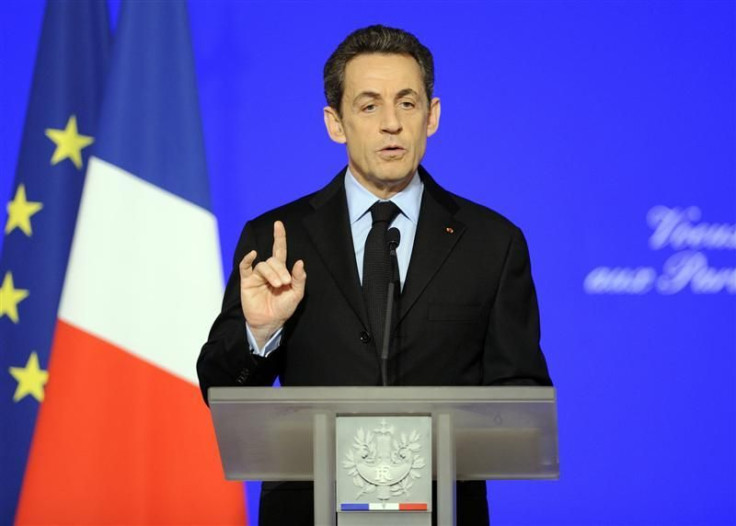France's President Nicolas Sarkozy to Bet on Growth Reforms as AAA Slips Away

France's loss of its much-prized triple-A credit rating three months from elections that will likely turn on the handling of the economy is a bitter blow for President Nicolas Sarkozy, who had made the top-notch grade a badge of honor.
Sarkozy is likely to use the fact the Standard & Poor's downgrade was not two notches, as happened to some other Eurozone countries, as a way of drawing a line in the sand as he prepares a raft of reforms focused on growth.
Stuck with some of the lowest popularity ratings of any French president, Sarkozy rushed through two sets of austerity measures late last year in a last-ditch attempt to save the triple-A rating and keep down borrowing costs.
But since the start of the year, having apparently resigned himself to a downgrade, Sarkozy has switched his focus to growth, vowing to overhaul welfare financing, company labor charges, and job flexibility, with plans for a so-called Social VAT to fund welfare and a tax on financial transactions.
Prime Minister Francois Fillon played down the impact of the downgrade on Saturday, but said it underscored the country's need to press on with its reform plans focused on competitiveness and growth.
This decision is a warning that should not be turned into a drama any more than it should be underestimated, Fillon said. Because the drifting off course of our public finances in the last 30 years is a major handicap for growth and employment, as well as for our national sovereignty.
Sarkozy -- who thrives on handling a crisis -- meets union leaders and employers for talks on Jan. 18 and has vowed to come out with some kind of deal on reforms.
The French downgrade came as S&P cut the credit ratings of nine Eurozone countries, blaming insufficient policy measures by the bloc's leaders. Although it leaves France a notch below Germany, which kept its AAA status, the ratings of Italy, Spain, Portugal, and Cyprus were downgraded by a costly two rungs.
Sarkozy's Rivals Seize on Downgrade
France has 1.3 trillion euros ($1.65 trillion) of outstanding debt and will issue as much as 178 billion euros in medium- and long-term paper this year, net of buybacks, to cover its deficit and expiring debt. Economists say the cut to an AA+ rating may have a limited impact on debt-servicing costs, however, given historically low French yields.
Nonetheless, opposition Socialist politicians have seized on Friday evening's downgrade to criticize Sarkozy's handling of the economy, blaming it directly on his policies.
Nicolas Sarkozy made keeping the triple-A a political objective and even called it an obligation for his government, Socialist presidential candidate and opinion-poll front-runner Francois Hollande said at a press conference on Saturday.
This battle has been lost. And this brings into question the credibility of the strategy implemented since 2007, he said, adding that it was Sarkozy's policies, not France, that had been downgraded.
The long-feared move, which may yet be followed by other rating agencies, comes as faltering economic growth has left French public finances looking vulnerable to shocks from the banking sector or debt-laden Eurozone peripheral countries. France had the highest debt-to-gross-domestic-product ratio of the Eurozone countries rated AAA before Friday's decision.
Center-right Sarkozy is lagging Hollande by 10 points ahead of the two-round election on April 22 and May 6, according to an opinion poll this week.
A separate survey by pollster Ipsos in December found that 54 percent of respondents thought that losing the triple-A rating would be serious for France.
The rating cut dominated Saturday's newspapers, with the left-leaning Liberation blazing below a front-page headline reading S_RKOZY that the president had lost an A.
Critics say Sarkozy had failed to match the economic-policy successes of the mightier Germany and was also failing to resolve the Eurozone's devastating debt crisis.
The economic policies, the fiscal policies have ended up in this level of debt, which is making us considerably weaker in the current crisis, Hollande ally Jerome Cahuzac, head of the National Assembly finance committee, told France Info radio.
($1 = 0.7895 euros)
(Reporting by James Regan; Editing by Catherine Bremer and Matthew Jones)
© Copyright Thomson Reuters 2024. All rights reserved.











